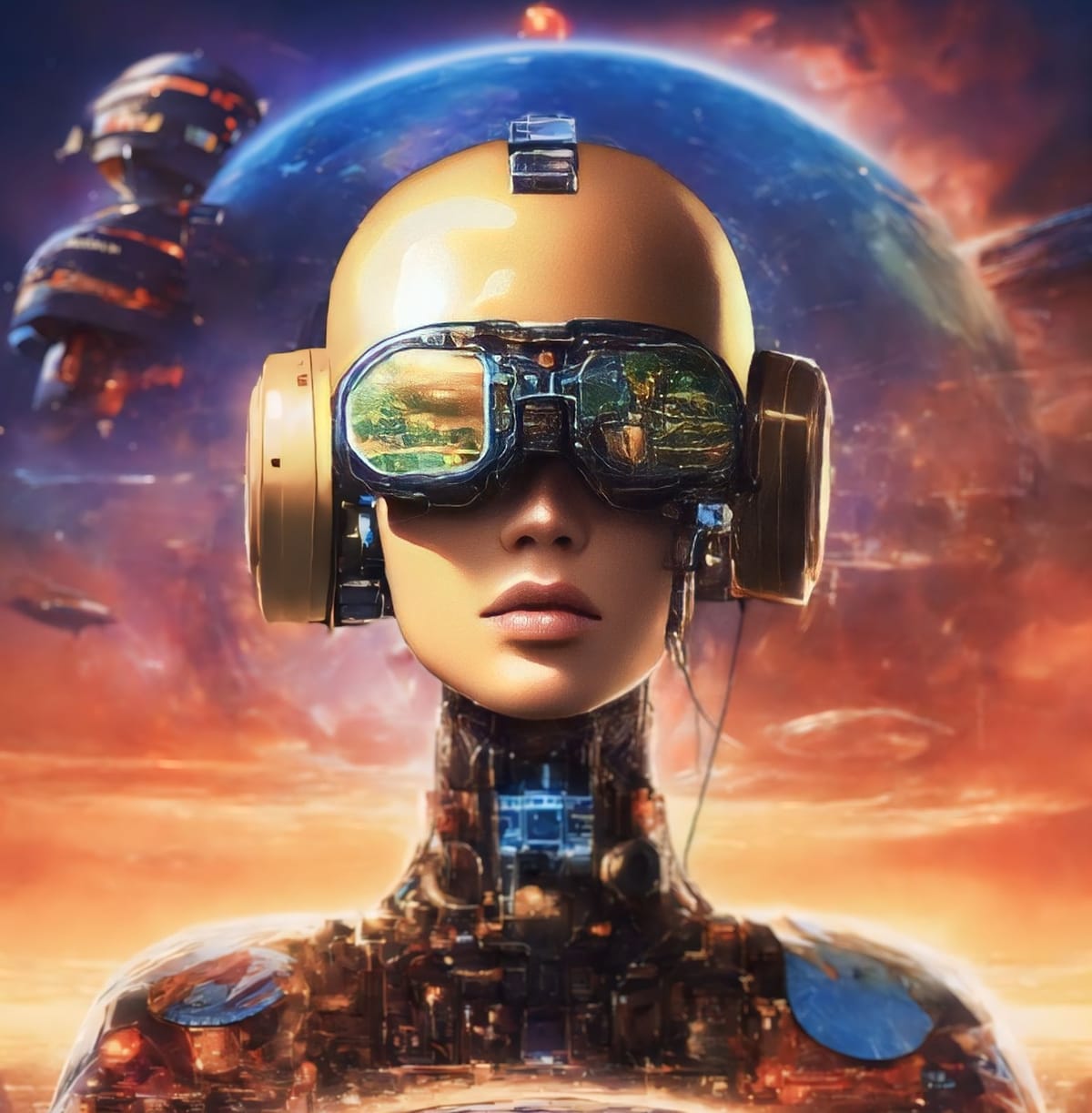ChatGPT Across 50 Indian Industries - The Complete Audiobook
This audiobook explores how ChatGPT has been utilized in 50 different sectors in India, ranging from education and healthcare to agriculture and finance.





Introduction
ChatGPT, an advanced language model developed by OpenAI, has revolutionized the way we interact with artificial intelligence and has found application in various fields across India.
This audiobook by "Srinidhi Ranganathan" explores how ChatGPT has been utilized in 50 different sectors in India, ranging from education and healthcare to agriculture and finance.
ChatGPT is built on the foundation of Generative Pre-trained Transformer (GPT) architecture, which enables it to understand, process, and generate human-like text.
With its ability to comprehend and generate text in natural language, ChatGPT has become an invaluable tool for automation, communication, and problem-solving in Indian industries.
In this audiobook, we will delve into the specific use cases of ChatGPT in various domains within India. For example, in the education sector, ChatGPT has been used to create interactive learning experiences for students, providing personalized tutoring and answering queries in real time.
Watch now:
Natural Language Processing
Natural Language Processing (NLP) is a field of artificial intelligence that focuses on the interaction between computers and humans through natural language. It involves the development of algorithms and models to understand, interpret, and generate human language in a valuable way. NLP has significantly advanced due to the availability of large amounts of textual data and the development of powerful computational resources.
NLP Techniques
Some of the key techniques used in NLP include:
- Tokenization: Breaking down a text into smaller units, such as words or sentences.
- Lemmatization and Stemming: Reducing words to their base forms to normalize text.
- Named Entity Recognition (NER): Identifying and categorizing named entities such as people, organizations, and locations in a text.
- Part-of-Speech Tagging (POS): Assigning a part of speech to each word in a sentence.
- Applications of NLP in India
- NLP has a wide range of applications in various fields in India, including:
- Language translation: NLP is used for translating Indian languages such as Hindi, Bengali, and Tamil into English and vice versa.
- Customer service: Many Indian companies use NLP-powered chatbots to interact with customers in their native languages.
- Healthcare: NLP is used for analyzing medical records and texts in Indian languages to extract valuable insights.
- Example: Language Translation
An example of NLP application in India is the development of machine translation systems for Indian languages. For instance, NLP has been used to build translation systems that can accurately translate Hindi news articles into English, enabling broader access to information for non-Hindi speakers.
Conclusion
NLP plays a crucial role in bridging the language gap and enabling effective communication in various domains in India. With further advancements in NLP models, the potential for NLP application in India is boundless.
Customer Service
Customer service plays a vital role in the success of any business. In India, customer service practices vary widely across different fields, but there are some common principles that are essential for providing excellent customer service.
In the retail sector, customer service involves greeting customers with a smile, assisting them in finding products, and addressing any issues or concerns they may have. For example, a popular Indian department store like Big Bazaar focuses on training its staff to provide personalized and attentive service to every customer.
In the banking and financial sector, customer service includes providing accurate information about banking products, assisting with transactions, and promptly resolving any account-related issues. For instance, HDFC Bank in India is known for its efficient customer service, with its representatives being available to assist customers with their needs at all times.
In the telecommunications industry, customer service involves helping customers with service activation, billing queries, and technical support for any issues with their phone or internet service. An example of this is Airtel, one of India's leading telecommunications companies, which offers 24/7 customer support to address any concerns or technical difficulties.
Across various industries, the key to providing exceptional customer service in India lies in effective communication, empathy, and a commitment to resolving customer issues in a timely manner. This dedication to customer satisfaction is integral for businesses to build and maintain a loyal customer base.
Sales
In the field of sales, ChatGPT plays a crucial role in assisting businesses with customer interactions, lead generation, and sales support. Through its natural language processing capabilities, ChatGPT can engage potential customers, answer their queries, and provide relevant product information to guide them through the sales process.
One example of ChatGPT's role in sales is its use in e-commerce websites. ChatGPT can be integrated into the chat support function of the website to answer customer queries, provide product recommendations, and even assist in completing transactions. By doing so, ChatGPT helps in improving the overall sales conversion rate by providing real-time assistance to potential buyers.
Another example is lead generation. ChatGPT can engage website visitors through chat-based lead generation forms, asking qualifying questions, and capturing contact information. This enables businesses to identify potential leads and follow up with them, ultimately leading to an increase in sales opportunities.
Moreover, in the realm of sales support, ChatGPT can assist sales representatives in their daily tasks. It can provide them with relevant customer information, product details, pricing, and even sales scripts to streamline their interactions and improve their selling effectiveness. This frees up the sales team's time, allowing them to focus on building relationships and closing deals.
Overall, ChatGPT's capabilities in natural language understanding and generation make it a valuable tool in the field of sales, helping businesses increase their sales effectiveness and drive revenue growth.
Marketing
Marketing in the Indian context is a diverse and dynamic field that requires a deep understanding of cultural nuances, consumer behavior, and the ever-changing landscape of technology and communication. From traditional methods such as print and television advertisements to newer digital marketing strategies, India offers a rich tapestry of opportunities and challenges for marketers.
Traditional Marketing
Traditional marketing methods in India still hold significant sway, especially in rural and semi-urban areas. Print media, radio, and television advertisements continue to be effective channels for reaching a wide audience. In addition, outdoor advertising in the form of billboards, posters, and banners is prevalent, particularly in densely populated cities.
Example: Hindustan Unilever's "Lifebuoy Swasthya Chetna" campaign used traditional media to educate rural communities about the importance of handwashing, leading to improved health outcomes.
Digital Marketing
With the widespread adoption of smartphones and affordable internet access, digital marketing has seen tremendous growth in India. Social media platforms such as Facebook, Instagram, and Twitter are popular channels for brand promotion and engagement. Moreover, search engine optimization (SEO), content marketing, and influencer collaborations have become integral components of digital marketing strategies.
Example: E-commerce giant Flipkart's "Big Billion Days" campaign leverages digital channels to create buzz and drive sales during the festive season.
Cultural Sensitivity
Marketing in India requires a strong awareness of cultural diversity and regional variations. Different states and communities may have distinct languages, traditions, and preferences, necessitating tailored marketing approaches. Understanding and respecting these differences is crucial for forging meaningful connections with consumers across the country.
Example: Coca-Cola's "Share A Coke" campaign customized its packaging with popular local names, fostering a sense of personalization and inclusivity among consumers.
Regulatory Landscape
Marketers in India must navigate a complex regulatory environment that governs advertising, data privacy, and consumer protection. Compliance with regulations such as the Consumer Protection Act, Advertising Standards Council of India (ASCI) guidelines, and the Telecom Regulatory Authority of India (TRAI) regulations is essential to avoid penalties and maintain brand reputation.
Example: Amul's "Taste of India" campaign adhered to ASCI guidelines by ensuring that its advertisements did not make false or misleading claims about its products.
In conclusion, marketing in India encompasses a wide spectrum of traditional and digital channels, demanding an understanding of cultural sensitivity and compliance with regulations. Successful campaigns often combine creativity, consumer insight, and adaptability to resonate with diverse audiences across the country.
Healthcare
Healthcare in India is a complex and diverse field, encompassing traditional medicine, modern healthcare systems, and a wide range of public and private health services. India's healthcare infrastructure is continuously evolving to meet the diverse and growing needs of its population.
One of the key challenges in Indian healthcare is accessibility, particularly in rural areas where infrastructure and resources are often limited. The government has taken steps to address this through initiatives such as the National Rural Health Mission, which aims to provide accessible, affordable, and quality healthcare to rural populations.
Traditional medicine also plays a significant role in Indian healthcare, with practices such as Ayurveda, Yoga, Naturopathy, Unani, Siddha, and Homeopathy being widely practiced. These traditional systems of medicine have been integrated into the country's healthcare system and are popular due to their holistic approach to health and wellness.
In addition to traditional medicine, India has a rapidly growing private healthcare sector, with the presence of multi-specialty hospitals, specialty clinics, and diagnostic centers. This sector offers advanced medical treatments, state-of-the-art facilities, and attracts not only domestic patients but also medical tourists from around the world.
Examples of notable advancements in Indian healthcare include the successful implementation of the world's largest health insurance scheme, Ayushman Bharat, which aims to provide financial protection to over 500 million citizens. Another example is the use of telemedicine and digital health technologies to reach remote populations and provide virtual consultations, especially during the COVID-19 pandemic.
Overall, healthcare in India continues to undergo significant transformation, driven by technological advancements, policy reforms, and an increasing focus on preventive and personalized care. As the country continues to address the challenges of accessibility and quality, it is poised to make further strides in providing comprehensive and inclusive healthcare for its population.
Education
Education in India is a diverse field, with a blend of traditional methods and modern technological advancements. ChatGPT has been instrumental in revolutionizing and enhancing the educational experience across various domains. From personalized tutoring to language learning, ChatGPT has transformed the way individuals access and consume educational content.
Personalized Tutoring
ChatGPT has enabled personalized tutoring by providing tailored learning experiences to students. Through its conversational interface, ChatGPT can assess a student's strengths and weaknesses, adapt the learning material accordingly, and provide real-time feedback. This personalized approach has significantly improved student engagement and performance.
Language Learning
ChatGPT has also played a crucial role in language learning. By offering interactive language practice sessions and cultural insights, ChatGPT has made language learning more accessible and enjoyable. Whether it's mastering a new language or honing communication skills, ChatGPT has become an invaluable tool for language enthusiasts.
Virtual Classroom Assistance
In the era of virtual classrooms, ChatGPT has emerged as a reliable assistant for both educators and students. It provides instant clarification of doubts, offers additional explanations on complex topics, and assists in creating interactive lesson plans. ChatGPT's presence in virtual classrooms has fostered a more collaborative and enriched learning environment.
Accessible Learning Resources
Furthermore, ChatGPT has facilitated access to a wide range of educational resources. By curating relevant study materials, practice exercises, and educational videos, ChatGPT has made it easier for students to supplement their learning and explore diverse subject matter. This increased accessibility has democratized education, allowing individuals from various backgrounds to engage with high-quality educational content.
In conclusion, ChatGPT's impact on education in India spans across personalized tutoring, language learning, virtual classroom assistance, and accessible learning resources. Its role in shaping a more interactive, personalized, and inclusive educational landscape has been transformative. As technology continues to evolve, ChatGPT is poised to further revolutionize the educational sector in India, making learning more engaging and accessible than ever before.
Finance
In the realm of finance, ChatGPT can be a valuable tool for various applications such as personal finance management, investment analysis, and even automated trading systems. With its natural language processing capabilities, ChatGPT can provide insights into financial news, market trends, and even offer personalized financial advice.
ChatGPT can assist individuals in creating and managing budgets, tracking expenses, and setting financial goals. By analyzing spending patterns and providing recommendations, ChatGPT can help users make informed financial decisions and develop a more secure financial future.
In the context of investment analysis, ChatGPT can process large volumes of financial data, analyze market trends, and provide insights into potential investment opportunities. By leveraging machine learning algorithms, ChatGPT can assist in predicting stock market movements and identifying potential risks in investment portfolios.
Furthermore, ChatGPT can be integrated into automated trading systems, where it can process real-time market data, execute trades, and provide insights into trading strategies. ChatGPT's ability to process complex financial information and make real-time decisions can be instrumental in developing advanced automated trading systems.
Examples of ChatGPT's application in finance include:
Personal finance management: ChatGPT can help users create and manage budgets, track expenses, and provide personalized financial advice.
Investment analysis: ChatGPT can analyze market trends, predict stock market movements, and identify potential investment opportunities.
Automated trading systems: ChatGPT can be integrated into automated trading systems to process real-time market data, execute trades, and provide insights into trading strategies.
Legal
In the legal field, ChatGPT can be utilized for various purposes such as legal research, drafting of legal documents, contract analysis, and legal advice. ChatGPT can assist lawyers and legal professionals in conducting legal research by quickly analyzing vast amounts of case law, statutes, and regulations. It can also generate drafts of legal documents such as contracts, pleadings, and briefs based on specific requirements provided by the user.
Furthermore, ChatGPT can be used for contract analysis by reviewing and extracting key provisions from contracts, thus helping legal professionals to identify potential issues or risks. It can also provide general legal advice on a wide range of topics, including but not limited to, intellectual property, employment law, real estate law, and more.
Examples of how ChatGPT can be used in the legal field include:
Assisting lawyers in conducting preliminary research for a case by analyzing relevant case law and statutes.
Generating a first draft of a contract based on specific terms and conditions provided by the user.
Analyzing and summarizing key provisions in a complex commercial contract for further review by a legal team.
Providing general legal advice on trademark registration process, including the steps involved and potential obstacles.
Overall, ChatGPT can significantly enhance the efficiency and productivity of legal professionals in various aspects of their work, from research and drafting to analysis and advisory services.
E-commerce
E-commerce, short for electronic commerce, refers to the buying and selling of goods or services using the internet. In India, the e-commerce industry has seen significant growth in recent years, driven by factors such as the increasing use of smartphones, improving internet connectivity, and the convenience and wide variety of products offered by online platforms.
Several major players dominate the Indian e-commerce market, including Amazon, Flipkart, and Snapdeal. These platforms offer a wide range of products, from electronics and clothing to groceries and home appliances. In addition to these general e-commerce websites, there are also specialized online marketplaces such as Myntra for fashion and BigBasket for groceries.
One of the key factors driving the growth of e-commerce in India is the increasing participation of small and medium-sized businesses. Platforms like Shopify and WooCommerce have made it easier for entrepreneurs to set up their own online stores and reach a larger customer base. This has led to the emergence of a vibrant e-commerce ecosystem with a diverse range of products and services.
The popularity of online shopping in India has also given rise to various support services such as digital payment systems, logistics and delivery providers, and online marketing agencies. The government's push for digital payments and initiatives like Digital India has further fueled the growth of e-commerce in the country.
Despite its rapid expansion, the e-commerce industry in India faces challenges such as fierce competition, logistic issues in certain regions, and regulatory hurdles. However, with the increasing consumer demand and technological advancements, the future of e-commerce in India looks promising.
Entertainment
Entertainment is an integral part of Indian culture, with a wide array of options to cater to diverse preferences. From Bollywood movies to traditional dance performances, India offers a rich tapestry of entertainment options.
Bollywood
Bollywood, the Hindi-language film industry, is known for its vibrant musical numbers, elaborate dance sequences, and captivating storylines. Movies like "Dilwale Dulhania Le Jayenge," "3 Idiots," and "Baahubali" have garnered international acclaim and a dedicated fan base.
Traditional Dance
India's diverse cultural heritage is reflected in its traditional dance forms, such as Bharatanatyam, Kathak, Odissi, and Kuchipudi. These dances are not only visually captivating but also steeped in history and mythology, making them a significant form of entertainment for both locals and tourists.
Music
Indian music encompasses a wide variety of genres, including classical, folk, and contemporary music. The fusion of traditional instruments with modern beats has given rise to popular music genres like Bollywood music, Indi-pop, and Sufi music, which are enjoyed by audiences across the country.
Theater
India has a rich tradition of theatrical performances, ranging from ancient Sanskrit plays to contemporary experimental theater. Cities like Mumbai, Delhi, and Kolkata are hubs for both traditional and modern theater productions, showcasing a diverse range of stories and performances.
Sports
Cricket is a national obsession in India, with the Indian Premier League (IPL) and international cricket tournaments drawing massive viewership. Apart from cricket, sports like kabaddi, football, and field hockey also have dedicated fan bases and contribute significantly to the entertainment industry.
Television
Indian television offers a variety of entertainment options, including soap operas, reality shows, and comedy programs. Shows like "Taarak Mehta Ka Ooltah Chashmah," "Kaun Banega Crorepati," and "Bigg Boss" have become household names, entertaining millions of viewers across the country.
Digital Entertainment
With the rise of digital platforms, streaming services like Netflix, Amazon Prime Video, and Hotstar have gained popularity in India. These platforms offer a mix of international and homegrown content, including movies, web series, and documentaries, catering to a diverse audience.
From the glitz and glamour of Bollywood to the colorful tapestry of traditional arts, India's entertainment landscape offers something for everyone, making it a vibrant and essential aspect of the country's cultural fabric.
Travel
In India, travel is a diverse and enriching experience that encompasses a wide range of landscapes, cultures, and traditions. From the snow-capped peaks of the Himalayas in the north to the pristine beaches of Goa in the west, and from the bustling streets of Delhi to the serene backwaters of Kerala in the south, India offers a plethora of travel opportunities for every kind of traveler.
One of the most popular forms of travel in India is pilgrimage tourism, where millions of devotees undertake journeys to sacred sites such as the Char Dham (Badrinath, Kedarnath, Gangotri, and Yamunotri) in the Himalayas or the temples of Varanasi and Rameswaram in the south. These journeys not only provide spiritual fulfillment but also showcase the diverse architectural styles and cultural practices of different regions.
For adventure enthusiasts, India offers a wide range of activities such as trekking in the Himalayas, paragliding in Himachal Pradesh, camel safaris in Rajasthan, and water sports in Goa. The country's diverse terrain and climate make it an ideal destination for those seeking adrenaline-pumping experiences.
Cultural enthusiasts will find plenty to explore in India, with its rich history and heritage. The majestic forts and palaces of Rajasthan, the intricately carved temples of Khajuraho, the ancient ruins of Hampi, and the colorful markets of Jaipur are just a few examples of the country's cultural wealth.
For wildlife enthusiasts, India's numerous national parks and wildlife sanctuaries offer the chance to spot tigers, elephants, rhinoceroses, and a variety of bird species in their natural habitats. The Ranthambore National Park, Bandhavgarh National Park, and Jim Corbett National Park are popular destinations for wildlife safaris.
India's railway network, particularly the extensive and iconic Indian Railways, provides a unique way to experience the country. The scenic routes of Darjeeling Himalayan Railway, the luxury trains like Palace on Wheels, and the Konkan Railway route offer a glimpse into India's diverse landscapes and cultures.
In summary, travel in India is a multi-faceted experience that offers something for everyone, from spiritual pilgrimages to adventure sports, cultural exploration, wildlife safaris, and unique transportation experiences.
Hospitality
In India, hospitality is deeply ingrained in the culture. Guests are considered a blessing, and it is customary to go above and beyond to make them feel welcome and comfortable. This culture of hospitality is reflected in various fields, from tourism to business to social gatherings.
In the tourism industry, the concept of "Atithi Devo Bhava" (the guest is equivalent to God) is widely practised. Whether it's a luxury hotel or a humble homestay, the staff make sure that the guests feel like royalty. They are greeted with garlands, offered traditional Indian refreshments like chai or lassi, and treated with the utmost respect and courtesy.
Even in the business world, hospitality plays a crucial role. During meetings and negotiations, it is customary to offer guests refreshments and snacks. The concept of "mi casa es su casa" (my house is your house) holds true, as hosts go out of their way to accommodate their guests, ensuring their comfort and satisfaction.
Social gatherings in India also revolve around hospitality. Whether it's a wedding, a festival, or a simple get-together, hosts spare no effort in making sure their guests feel at home. Elaborate feasts are prepared, and guests are treated to a variety of traditional dishes, sweets, and beverages.
Example: When a foreign traveler visits a remote village in India, they are often invited into a local family's home. The family ensures that the traveller is well-fed and comfortable, even if they have to rearrange their own sleeping arrangements to accommodate the guest.
Example: During a business conference, the host company goes out of its way to provide comfortable accommodations, transportation, and meals for its international partners, ensuring a seamless and enjoyable experience during their stay.
This commitment to hospitality is not just a formality in India, but a genuine expression of warmth, respect, and generosity towards guests. It is a reflection of the country's rich cultural heritage and a testament to the importance placed on human connections and relationships.
Technology
Technology has played a crucial role in the advancement of various fields in India. From agriculture to healthcare, technology has brought about significant changes and improvements.
In agriculture, technology has revolutionized farming techniques, leading to increased productivity and efficiency. For example, the use of drones for crop monitoring and precision agriculture has enabled farmers to better manage their resources and optimize their yields.
In healthcare, technology has facilitated better diagnosis and treatment. Telemedicine platforms have made healthcare more accessible, especially in remote areas. Additionally, the use of AI and machine learning in medical imaging has improved the accuracy of diagnostic procedures.
In education, technology has transformed the way students learn and interact with information. E-learning platforms and virtual classrooms have made education more flexible and accessible, breaking down geographical barriers.
In manufacturing, technology has led to automation and the implementation of Industry 4.0 practices. This has resulted in increased productivity and cost savings for Indian industries.
Overall, technology has been a driving force in the progress of various fields in India, and its continued development and integration will be crucial for the country's future growth.
Artificial Intelligence
Artificial Intelligence (AI) is a branch of computer science that aims to create intelligent machines that can perform tasks that typically require human intelligence. These tasks include visual perception, speech recognition, decision-making, and language translation.
AI encompasses several subfields, including machine learning, natural language processing, robotic process automation, and expert systems. Machine learning, in particular, has gained significant attention in recent years, as it enables computers to learn from and make decisions based on data without being explicitly programmed.
In India, AI has made significant advancements across various industries. For example, in healthcare, AI is used for medical imaging analysis, drug discovery, and personalized treatment recommendations. In agriculture, AI is utilized for crop monitoring, yield prediction, and pest detection. In finance, AI is employed for fraud detection, risk assessment, and customer service chatbots.
One notable example of AI innovation in India is the development of the world's first AI chip for edge devices by a Bengaluru-based startup. This chip is designed to enable AI computing at the edge, allowing devices such as smartphones and IoT devices to process data and make decisions locally without relying on cloud connectivity.
As AI continues to advance, it is expected to revolutionize various aspects of Indian society, from healthcare and education to manufacturing and transportation. However, there are also concerns about the ethical implications of AI, such as privacy, bias, and job displacement, which will need to be carefully addressed as the technology evolves.
Machine Learning
Machine learning is a subset of artificial intelligence that focuses on the development of algorithms and statistical models that enable computers to improve their performance on a specific task through experience. In other words, machine learning allows the computer to learn from data and make decisions or predictions based on that data, without being explicitly programmed to do so.
Machine learning can be divided into three main categories: supervised learning, unsupervised learning, and reinforcement learning. In supervised learning, the algorithm learns from labeled data, making predictions or decisions based on that data. Unsupervised learning involves the algorithm learning from unlabeled data, finding patterns or structure within the data. Reinforcement learning is a type of learning where the algorithm learns through trial and error, receiving feedback in the form of rewards or penalties.
In the Indian context, machine learning has found applications in various fields such as healthcare, finance, agriculture, and education. For example, in healthcare, machine learning algorithms have been used to predict diseases, analyze medical images, and optimize treatment plans. In finance, machine learning is used for fraud detection, risk assessment, and algorithmic trading. In agriculture, machine learning helps in crop yield prediction, soil analysis, and pest detection. In education, machine learning is used for personalized learning, student performance prediction, and adaptive learning platforms.
Furthermore, India has seen a rise in the development and adoption of machine learning applications in various industries such as e-commerce, transportation, and manufacturing. Companies in India are using machine learning for recommendation systems, route optimization, demand forecasting, predictive maintenance, and quality control.
Overall, machine learning has become an integral part of various sectors in India, with a growing number of professionals and researchers contributing to the advancement of machine learning techniques and applications in the country.
Data Analysis
Data analysis is a crucial step in utilizing ChatGPT across various fields in India. This process involves inspecting, cleaning, transforming, and modeling data to uncover valuable information, and conclusions, and support decision-making.
Steps of Data Analysis
Data Collection: Gathering relevant data from various sources such as surveys, databases, or social media platforms.
Data Cleaning: Removing any irrelevant, duplicate, or erroneous data to ensure accuracy and consistency.
Data Exploration: Utilizing statistical methods and visualization tools to understand the patterns, trends, and relationships within the data.
Data Modeling: Applying statistical models and machine learning algorithms to make predictions or derive insights from the data.
Interpretation and Presentation: Communicating the findings and insights derived from the analysis in a clear and understandable manner.
Example:
Suppose we want to analyze customer feedback data for a popular Indian e-commerce platform. The steps involved in data analysis would be as follows:
Data Collection: Collecting feedback from various channels such as surveys, social media, and customer reviews.
Data Cleaning: Removing any duplicate feedback, correcting spelling errors, and categorizing the feedback into positive, negative, or neutral sentiments.
Data Exploration: Using visualization tools to identify common themes or recurring issues in the feedback data.
Data Modeling: Building a sentiment analysis model to predict the sentiment of future customer feedback.
Interpretation and Presentation: Summarizing the key findings and presenting actionable insights to improve customer satisfaction.
In conclusion, data analysis is a fundamental aspect of leveraging ChatGPT in diverse Indian fields, providing valuable insights and driving informed decision-making.
Business Intelligence
Business Intelligence (BI) refers to the use of data, technology, and analytics to support business decision-making. In the context of Indian fields, BI plays a crucial role in helping organizations gain insights, identify trends, and make informed strategic decisions.
Importance of Business Intelligence in Indian Fields
In India, BI is becoming increasingly important as businesses seek to leverage data to gain a competitive edge. With the growing digital landscape and emphasis on data-driven decision-making, BI helps Indian companies in various industries to:
Retail: Analyze consumer behavior, forecast demand, and optimize inventory management.
Finance: Monitor market trends, manage risk, and enhance customer satisfaction through personalized offerings.
Healthcare: Improve patient care and operational efficiency, while also addressing compliance and regulatory requirements.
Telecommunications: Understand customer usage patterns, optimize network performance, and identify new revenue opportunities.
Manufacturing: Streamline production processes, reduce costs, and enhance supply chain management.
Examples of Business Intelligence Implementation in India
Flipkart
The Indian e-commerce giant Flipkart utilizes BI to analyze customer data, optimize supply chain management, and enhance personalized recommendations. Through BI, Flipkart has been able to gain actionable insights into consumer behavior and preferences, leading to improved sales and customer satisfaction.
HDFC Bank
As a leading financial institution in India, HDFC Bank leverages BI to analyze market trends, manage risks, and personalize financial products for its customers. By harnessing the power of BI, HDFC Bank is better equipped to make strategic decisions and stay ahead in the competitive banking landscape.
Apollo Hospitals
In the healthcare sector, Apollo Hospitals uses BI to improve patient care, optimize resource allocation, and streamline operational processes. Through BI-driven analytics, Apollo Hospitals has been able to enhance clinical outcomes, reduce costs, and deliver a higher standard of healthcare services.
In conclusion, Business Intelligence is an integral part of decision-making processes across various Indian fields, enabling organizations to harness the power of data and technology for strategic advantage.
Cybersecurity
Cybersecurity is a critical component in today's digital age, especially with the increasing number of cyber threats and attacks. In India, cybersecurity is essential in various fields including government organizations, financial institutions, healthcare, education, and businesses of all sizes.
Importance of Cybersecurity in India
With the rapid digital transformation happening in India, the importance of cybersecurity cannot be overstated. As more Indian businesses and government services go online, the risk of cyber attacks also increases. Cybersecurity is crucial to protect sensitive information, prevent data breaches, and safeguard critical infrastructure from malicious actors.
Examples of Cybersecurity Measures
Two-factor authentication (2FA)
Two-factor authentication is a common cybersecurity measure that adds an extra layer of security by requiring users to provide two different authentication factors. For example, apart from entering a password, the user may need to input a code sent to their mobile device or generated by an authentication app.
Encryption
Encryption is the process of converting data into a code to prevent unauthorized access. In India, organizations use encryption to secure sensitive information such as financial data, personal records, and intellectual property.
Firewalls
Firewalls are essential for network security in India. They act as a barrier between a trusted internal network and untrusted external networks. Firewalls monitor and control incoming and outgoing network traffic based on predetermined security rules.
Government Initiatives in Cybersecurity
The Indian government has taken significant steps to enhance cybersecurity across the country. Initiatives such as the National Cyber Security Policy, Cyber Swachhta Kendra (Botnet Cleaning and Malware Analysis Centre), and the National Critical Information Infrastructure Protection Center (NCIIPC) aim to strengthen the cybersecurity posture of the nation.
In conclusion, cybersecurity is integral in safeguarding India's digital assets, privacy, and critical infrastructure. As technology continues to advance, the need for robust cybersecurity measures and vigilant practices becomes increasingly imperative.
Conclusion
In this book, we explored the application of ChatGPT in various fields in India, ranging from healthcare to education, finance to agriculture, and more. Through our exploration, it became evident that ChatGPT has the potential to revolutionize the way we interact with technology and enhance the efficiency and effectiveness of various processes.
We discussed how ChatGPT can assist in providing medical consultations in remote areas, improving customer service in the finance industry, facilitating personalized learning in education, aiding in crop management for farmers, and much more. The versatility and adaptability of ChatGPT make it a valuable tool that can be tailored to different industries and domains.
Furthermore, we also delved into the potential challenges and ethical considerations associated with the widespread adoption of ChatGPT in India. These include issues related to data privacy, algorithmic biases, and the need for regulatory frameworks to govern the use of AI technologies.
As we conclude this book, it is important to recognize that the integration of ChatGPT in Indian fields has the potential to significantly impact and transform these sectors. It is crucial for stakeholders, including policymakers, businesses, and technologists, to work collaboratively to maximize the benefits of ChatGPT while mitigating its potential drawbacks.
In closing, it is clear that ChatGPT is poised to play a pivotal role in shaping the future of diverse industries in India. The possibilities are vast, and with careful consideration and strategic implementation, ChatGPT can contribute to sustainable progress and innovation across the nation.
As a final note, while this book has provided a comprehensive overview of the potential applications of ChatGPT in Indian fields, it is important to recognize that the field of AI is constantly evolving. Therefore, it is imperative to continue monitoring advancements in AI technology and its implications for Indian industries.
The examples we discussed throughout this book serve as a testament to the transformative power of ChatGPT in various Indian fields. From healthcare chatbots providing medical assistance to farmers using chat-based tools for agricultural guidance, the impact of ChatGPT is already being felt. These examples offer a glimpse into the promising future of ChatGPT in India, where its integration has the potential to streamline processes, enhance access to services, and drive innovation.
In conclusion, the potential of ChatGPT in Indian fields is vast, and as we move forward, it will be essential to harness this potential responsibly and ethically. The future is indeed bright as we witness the evolution of AI technology, and ChatGPT is at the forefront of this revolution.
Connect with Digital Marketing Legend "Srinidhi Ranganathan" on LinkedIn:

Check out these amazing content from Bookspotz and New Bots:























